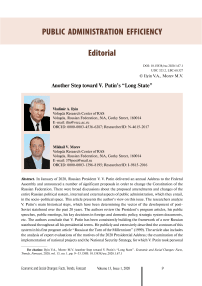Another step toward V. Putin's "long state"
Автор: Ilyin Vladimir A., Morev Mikhail V.
Журнал: Economic and Social Changes: Facts, Trends, Forecast @volnc-esc-en
Рубрика: Public administration efficiency. Editorial
Статья в выпуске: 1 т.13, 2020 года.
Бесплатный доступ
In January of 2020, Russian President V. V. Putin delivered an annual Address to the Federal Assembly and announced a number of significant proposals in order to change the Constitution of the Russian Federation. There were broad discussions about the proposed amendments and changes of the entire Russian political system, internal and external aspects of public administration, which they entail, in the socio-political space. This article presents the author’s view on this issue. The researchers analyzeV. Putin’s main historical steps, which have been determining the vector of the development of post- Soviet statehood over the past 20 years. The authors review the President’s program articles, his public speeches, public meetings, his key decisions in foreign and domestic policy, strategic system documents, etc. The authors conclude that V. Putin has been consistently building the framework of a new Russian statehood throughout all his presidential terms. He publicly and extensively described the contours of this system in his first program article “Russia at the Turn of the Millennium” (1999). The article also includes the analysis of expert evaluations of the motives of the 2020 Presidential Address; the examination of the implementation of national projects and the National Security Strategy, for which V. Putin took personal responsibility in 2015; statistical data, describing the state of affairs in the areas of demography and health, science and education, economic growth and population’s quality of life over the past 30 years. The results of the study allow us to say that the President’s initiatives, aimed at the transformation of the country’s entire political system, are largely forced. It is a necessary condition for the completion of the goal, set by him in 1999, until the end of his presidential term, limited by the current Constitution of the Russian Federation - the creation of a strong, independent social state with a stable political system, which effectively adapts to internal and external challenges.
President, address to federal assembly, national security strategy, rf constitution, transit of power
Короткий адрес: https://sciup.org/147224250
IDR: 147224250 | УДК: 323.2 | DOI: 10.15838/esc.2020.1.67.1
Текст научной статьи Another step toward V. Putin's "long state"
On January 15, 2020, the Russian President Vladimir Putin delivered another annual Address to the Federal Assembly, which, according to most experts, immediately acquired “historical significance”, which could be compared to the President’s “Munich speech”, delivered in February of 2007. 12
“2020 federal Address of the Russian President has a historical significance, – says confidently Alexey Zolotarev, vice-chairman of regional parliament. – I will point out three such landmark messages for Russia: Putin’s Munich speech on a multi-polar world in international politics, the speech on the joining of Crimea, which concerns the territorial integrity of the state, and the current message with an emphasis on domestic policy. It signaled the transition to the next political level of the country’s development” 1 .
“The modern history of, at least, our country has begun. Or, more likely, the whole world. The text of today’s Address to the Federal As-sembly of the Russian Federation will be studied and outlined by schoolchildren and students. Just like the materials of the last Congress of the CPSU” 2 .
Sensational innovations of the Address were expected even before its announcement. Especially after the official announcement of the date – January 15, for the first time this early 3 . Mostly, everyone expected responses to two issues: whether the President will critically assess the progress of national projects (with all following organizational decisions), and whether he will announce any measures regarding the transit of presidential power in 2024 (in particular, whether the changes, regarding Presidential terms, etc., will be introduced in the Constitution).
However, systematic decisions, announced in the Address, turned out to be much more ambitious. We need to remind that the President’s Address to the Federal Assembly included two distinct parts: social, when he proposed a number of direct measures aimed at improving the population’s life quality and the development of the country’s demographic potential, and political, when he introduced a number of changes in the Constitution of the Russian Federation: the priority of the Constitution of the Russian Federation over the norms of international law, the inability to have foreign citizenship for persons holding positions which are “critical for the security and sovereignty of the country”, the approval of members of the Government of the Russian
Federation by the State Duma, the inclusion of the municipal level into the single system of public power, etc. 4 . 5
…Today, a number of political public associations are raising the question of adopting a new Constitution. I want to respond right away: I believe that this is not necessary. The potential of the 1993 Constitution is far from being exhausted, and I hope that the fundamental foundations of the constitutional system, human rights and freedoms will remain a solid value basis for Russian society for many decades to come 5 .
Despite the fact that the President spoke only about amendments to the Main law, emphasizing that its potential is “far from being exhausted” even in modern conditions, such large-scale constitutional changes have not been made since its adoption. The Address was not only about consolidating social guarantees of the state in the country’s Main law, but also about the transformation of the political system, the nationalization of elites, and the priority of Russian legislation over international law.
What caused such radical and unexpected proposals, announced in the Address by the President, who (as everyone is used to, and as he has repeatedly said it himself) always acts as carefully as possible, without haste, calculating all possible consequences of his actions?
The analysis of expert opinions allows stating a whole complex of external and internal reasons. According to some experts, the 2020 Address to the Federal Assembly was the beginning of the transition of power : the President initiated a comprehensive transformation of the political system to prepare it for his departure from the Presidential post in 2024 6 .
Experts on Vladimir Putin’s meeting with political scientists on February 6, 2012:
“Vladimir Putin’s answers to questions about political reforms and the correction of governance mechanisms made his general approach clear. He understands the need for changes, but he is very concerned that any undue acceleration of this process may question the management of the system. Whether it is the registration of parties, the return of elected governors, the expansion of the participation of civil society in political decisionmaking, the selected approach is very cautious and conservative: it is like he acts according to the medical principle “do no harm”.
Thus, Vladimir Putin understands that “extension” is impossible without expanding public political space, but he does not trust this process very much. He constantly looks for additional “checks”, built-in mechanisms that would ensure smooth, manageable changes and, in fact, guarantee that everything that was built earlier will not be questioned” 7 .
Other experts say that the world economy will face a global economic crisis very soon (may be, this year), and, in order to be ready for it, Russia needs to develop and test a new configuration of the political system right now 8 .
Some experts recall the unsatisfactory progress of national projects and extremely tight deadlines for their implementation, emphasizing that, if radical changes do not begin now, it will be too late 9 .
Another opinion is that the President begins to assemble the Union State (or USSR–2), which is facilitated by the political situation in the world and, especially, in the United States 10 .
The fifth opinion: the President loses confidence in his inner circle and therefore wants to create “institutional or constitutional guarantees” that the political system, built by him (as well as his own position in it) will continue to exist for many years, regardless of the opinions of individuals. This is why additional centers of power (except the President of the Russian Federation) – the State Council, the Federation Council, the State Duma, and the Supreme Court – are created in the political system, or, rather, given higher powers 11 .
Of course, all aforementioned opinions, most likely, were a part of motives that guided the President in his personal work on the Address (as the President’s Press Secretary D. Peskov has repeatedly said). However, in our opinion, high-profile domestic political events, which took place inside the country in January of 2020, in many ways, should be considered as the part of one of Vladimir Putin’s big strategic plans for creating a new (after the collapse of the USSR) Russian statehood, which he started to implement in 1999, publicly stating strategic priorities in his first program article “Russia at the Turn of the Millennium”: “Russian idea”, “strong state”, “efficient economy” 12 . His “Munich speech” in 2007, “Valdai speech” in 2013, “Crimean spring” in 2014 are the pieces of a single puzzle called “long state” 13 , just like the Address–2020. This is clearly manifested in the logic and content of President’s public speeches ( Insert 1 ).
Earlier, we wrote: “categories that V. Putin uses and all tasks and issues, which he sets for
In the modern world, the country’s power is manifested not so much in military strength as in the ability to be a leader in the creation and application of advanced technologies, ensuring a high level of well-being of the people, in the ability to reliably protect their security and defend national interests on the international arena 14 .
himself and the country, are designed to last not just for years, but for decades. It shows that Putin, first of all, is a politician who “plays a long game”. He is a public official who sets goals, which are historically significant for the country, understands the need to achieve these goals, and realizes his historical responsibility to the country 15 . It needs to be reminded that, in 2000, Vladimir Putin “took” a practically ruined country, but even then, despite a wide range of acute external, internal, political, and economic crises, he never ceased to see the wide historical perspective of Russia, focusing on “rapidly occurring fundamental changes of life associated with the formation of so called postindustrial society”, which he publicly announced in his first program article in 1999 16 .
What place Russia should, can, and will take in a global civilization of a new formation? This question probably dictated all the actions of the President: from the “Chechen campaign” to current events. According to this logic, the President’s Address to the Federal Assembly of the Russian Federation in 2020 became a consistent, regular step of a historical nature, going far beyond dissatisfaction with the implementation of national projects or the preparation of the political system for the transit in 2024.
Insert 1
(V
Ф
Ф
Ф
Ф
E
rara
Ф >
Ф
E Ф
(V
(V
(V
(V
(V
E (V
Ф
Ф
О
го Е
Ф и
E
E
ф
ф ф
Ф
га с о га
ф
ф
Ф
(V
Ф
Ф
ф
ф ф
ф ф
5 о
(V
га
ф
(V Ф
E (V
Е ф ф
ra
ф
Ф
E
ra
Ф
го .2
ф Е ф ф
ra
(V
E
(V
ст ф Е
ф
ф
ф

<:
Ф
(V E
E (V
Ф > (V
ф
ф Q.
Е о
E
ф
ф
ф
(V
ra о
Ф
Ф
5 E
ад
(V
ад
(V
си
= E
E
Ф
Ф
(V
Ф
(V Ф
Ф
^ 5
га -D о ад
о 5
ф
E
ф
га
§
о ф > о
Е о
ф
О С D. ^ Е
ra
ф
Ф
Ф
E
ад о
— ф
■о -о
5 ф
о
о ф > ф •и га
ад о
ад ° с ^
ra
ra
Ф x ф
га с о га с 5 ф
£ 5
Е
ф
ф
ф
Е
ф
E
ф
4- JZ ад
Е
ф
ф
ф
ф
ф
ra
ra ra
ад
ф О
ф о с ф
ф
ф
ra
ф
ад с ф
ф
ф ^
5 ф ф
ф
ф
о ф
га 5 ф
ф
ф =)
V u- 0J
Е
ф
ф
ra
ад о о ф
ф Е ф
ф
ф
ra
ф
ф
o
ф
<
ф > ф
ф
^
О 5
Е ф ф
End of Insert 1



Let us take the liberty and assume that Russia of the future, which the President has been building for the last 20 years, largely incorporates features of post-war USSR (particularly, its international status), but it operates on a qualitatively different basis which corresponds to the new Millennium – on the developed principles of democracy, an efficient combination of a market economy and a social state, respect for sovereignty and national interests in a globalizing world. 17
The most important factor of the state’s competitiveness in the struggle for a place in the system of political and economic relations of the future is a protected state sovereignty, but protected from the military and socio-economic point of view 17 .
If we think in broad “strokes”, the President has always had only one opponent on his way of creating this kind of state: experts call this opponent “the collective West”. Russia’s foreign policy and domestic events are parts of one big game, a stake of which is “a place in the sun” in the future of world civilization. Russia’s victories and defeats in this game were determined by historical tasks that the President considered a priority, and the solution of which he took, as they say, into his own hands. Thus, in the first half of the 2000s, the main task of the President was to restore the country from the ruins, left after the crisis period of the 1990s.
He spent the second half of the 2000s restoring geopolitical status of Russia, which started with the “Munich speech” in 2007. During this period, the government of Dmitry Medvedev handled the domestic development of the country, and this is where Vladimir Putin’s Big Plan turned out to have vulnerabilities: “foreign partners” did not fail to take advantage of it. The liberal wing of the
Medvedev’s Government was not so focused on restoring Russian sovereignty and implementing national interests.
In the period of D. Medvedev’s presidency (2008–2011), Russia participated in a “five-day” war with Georgia (August, 2008). As the result, our country “turned from a peacekeeper in the South Caucasus into a participant of the conflict on the side of rebellious Georgian regions” 18 . According to experts, Dmitry Medvedev actually “betrayed Libya by providing, despite interests of Russia, invaluable assistance to the United States in Libya’s defeat” 19 (2011). Finally, under his rule, widespread protest movements broke out in the country, including a rally on Bolotnaya square in Moscow (December, 2011). Perhaps, the greatest historical accomplishment of Dmitry Medvedev was his refusal to run for his second presidential term and the return of “reins” into V. Putin’s hands, so he could continue political course, started in 2000.
The domestic development of the country, which coincided with the global financial crisis during Dmitry Medvedev’s presidential term, took a “step back”, and then Vladimir Putin again turned his attention to solving internal problems. There were “May Decrees”, and a “wave” of anti-corruption campaign rose. In a moment of some demoralization and disillusionment of society (due to the deterioration of life quality), Vladimir Putin put his faith in society not just to “support” it, but to consolidate it and turn it into a force that will play a major role in the country’s governance in the future. All-Russia People’s Front (2011) emerged, and, in 2013, the President initiated (as experts noted) “the first, after the collapse of the Soviet Union, global attempt of RF authorities to form a new political ideology for Russia”20 (V. Putin’s speech at Valdai forum in 2013).
The following international events (Ukrainian conflict, conflict in Syria, sanctions, and the increase of anti-Russian attitudes in Europe) made the President come back to issues of foreign policy, and we remember the success of his actions: the American “fanned” fire in Ukraine ended with the “return of Crimea and Sevastopol to their native harbor”, and Russia’s participation in the Syrian campaign became a loud statement to the world that the country is ready for any international vicissitudes.
After raising the military-industrial block from scratches, the President proved that this was possible. Without observing the same efficiency in domestic socio-economic development and realizing that further economic stagnation will not allow him to achieve the goals that he set for himself in 1999, he took another historical step: he introduced significant changes to the National Security Strategy and took personal responsibility for its implementation (2015).
A detailed comparative analysis of the National Security Strategy – 2015, approved by Vladimir Putin, and the National Security Strategy – 2009, signed by Dmitry Medvedev, is given in insert 2 . Here, we would like to emphasize that, while maintaining an unchanged list of key national security priorities, each of them was given a completely new content . The general summary of these innovations is aimed at developing the level and quality of life of “ordinary” Russians and ensuring the sovereign, independent development of the country itself – the main principles of building a future Russian statehood, which the President wrote about in 1999.
After noting in the National Security History that the implementation of its main provisions will be “governed by the President of the Russian Federation” 21 , V. Putin announced to the state apparatus, liberal elites, and Russian society in general that he will now personally control the course of events in Russia’s foreign and domestic policy. His further actions (in particular, his Addresses to the Federal Assembly in 2018 and 2020) are the results of this control.
Indicated constitutional restrictions of presidential terms of V. Putin (according to the current Constitution of the Russian Federation), as well as objective global trends, associated with the rapid pace of technological progress and growing requirements of society in the transition from stability to dynamic development of the level and life quality of major sections of the population, made the President declare a policy of “decisive breakthrough”. Without it, it would be impossible to count on maintaining state sovereignty on the world stage or a stable sociopolitical situation inside the country.
It was done in the Address–2018. In March of 2018, the President began his annual address to the Federal Assembly with the thesis on “a very special landmark” nature of his speech and “the times we are living in”, underlying that “the state’s role and positions in the modern world are not determined only or predominantly by natural resources or production capacities; the decisive role is played by people... Therefore, everything hinges on efforts to preserve the people of Russia and to guarantee the prosperity of our citizens. We must achieve a decisive breakthrough in this area” 22 .
Insert 2
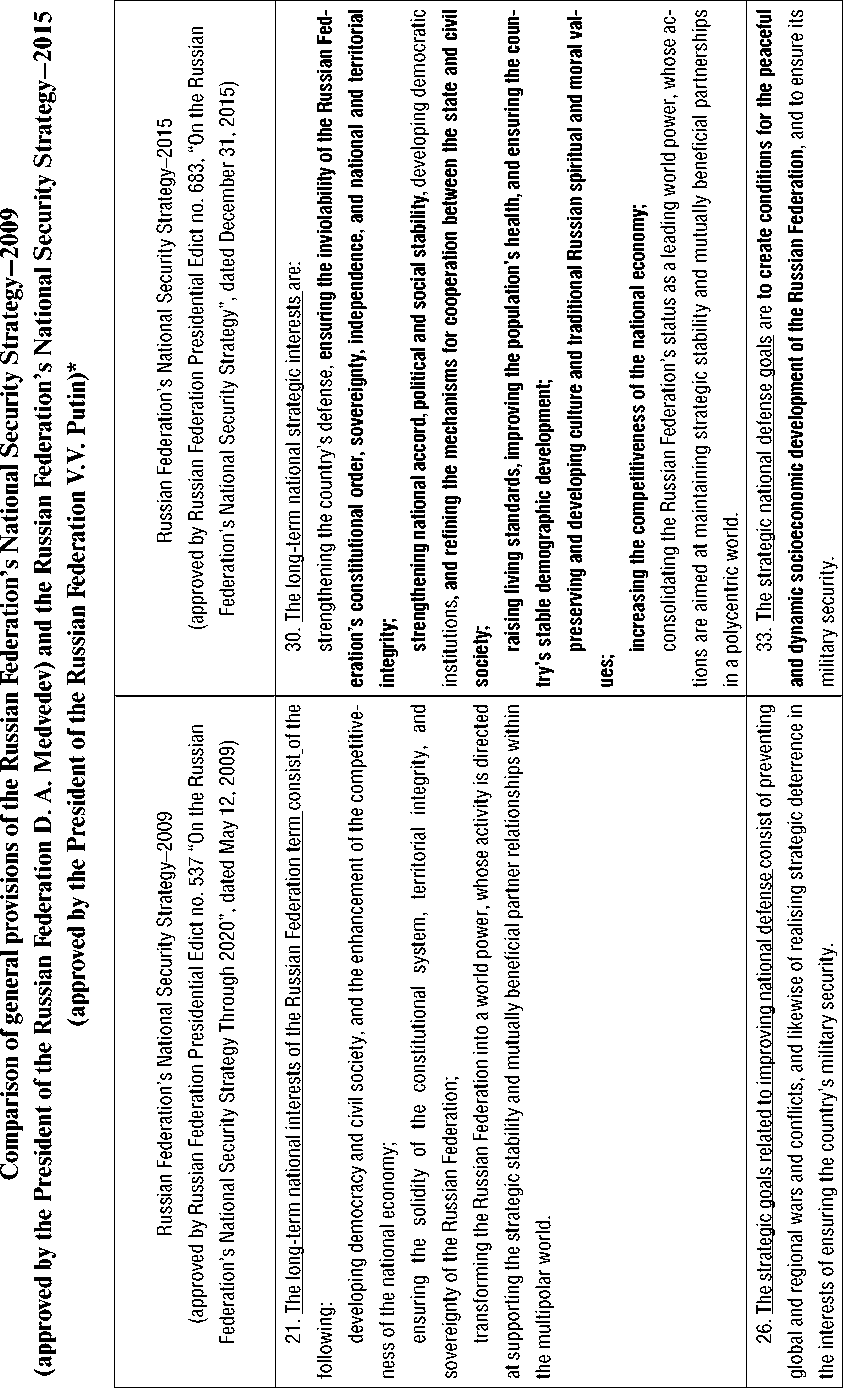
The key innovations of the National Security Strategy–2015 are highlighted in bold.
Continuation of Insert 2
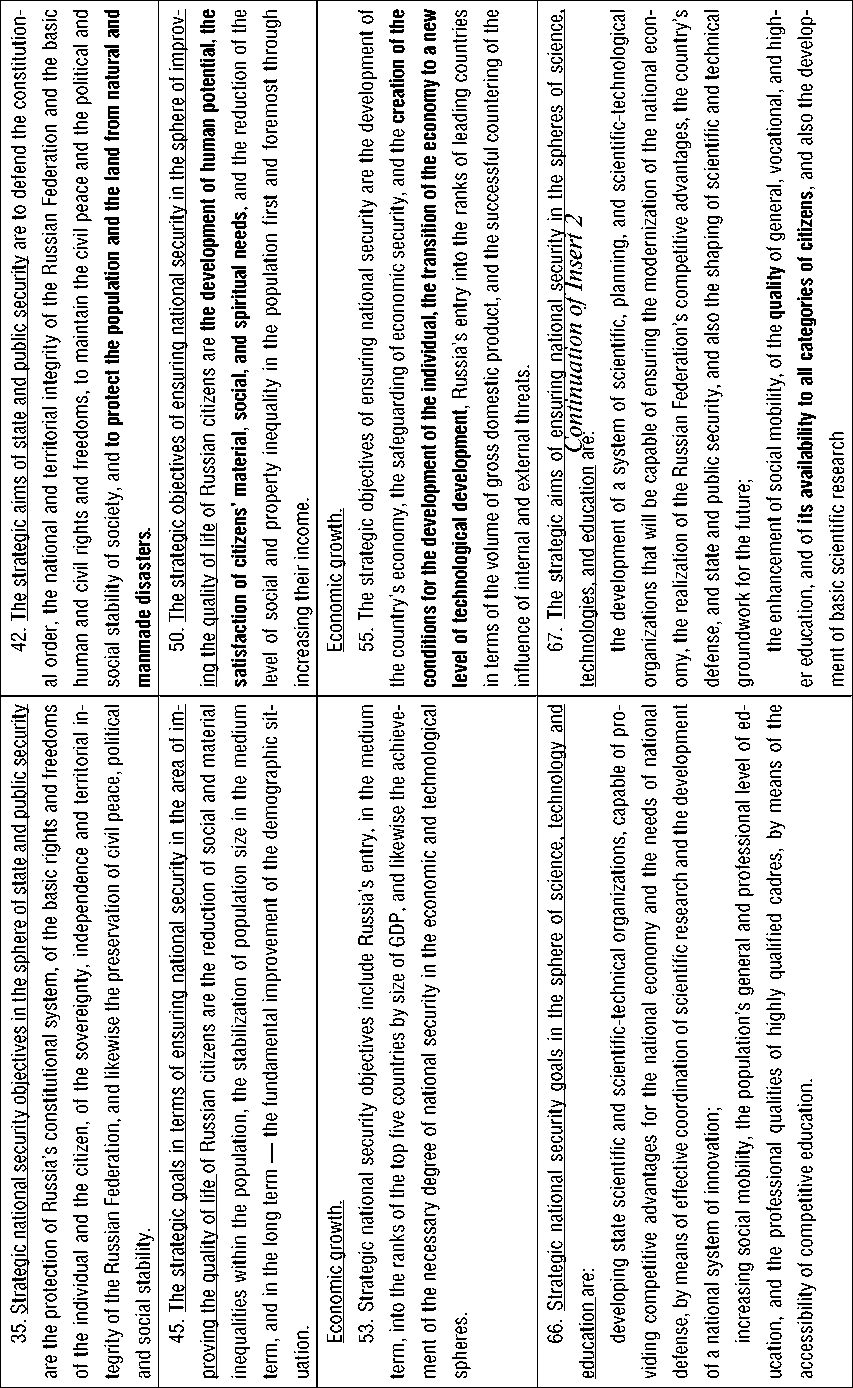
Continuation of Insert 2
|
сс _d О -d ГС CD -d О "d ГС CD ГС -d Тс CD -d о с Е о гс 1— |
СО Тс d о ГС d 1 CD О СС * ГС СС d ГС о Е То о Е ГС ГС СС d о Тс 13 о со "d о ГС d ГС "со |
о .2 ГО £ 5 га й £ CL CL "d ^ го о. ”5 5 ® и 2 d ° го £ '^ го £ 75 го ,го о о о — S ^ о °" о 2 " < “ ст ст 2 О ■— о га го га >. и = о £ 5 — ГС *- 5 ГС со С ~ ° CD — Е со ГС гс ° ^ С Г Е го 5 = | ё „го го го — ст ст „ V £ ст -а с ^ с " ~ ст ° с § ° — г го S о £ = » cz .ст - £ £ га £ .2 ° .^ С = 2 го ГС О > о со — CD > ГО „о с ст > ы и Е ГС о 00 £ 5 о ^ ГС — 05 ±= ° со — ГС QJ CD CD ГС 2" го го — 5 > го Ест2гоооиЕ — ~£и — дго"Е го cd о го га госсГОЕЕо„го СТООсОО^ОСЭ s„-.E--ro-a> •-2 с — CL ГО "ого |
гс гс гс "5 о гс Тс О гс с о d ГС О СО Е "гс о гс гс со 1— со |
_L => = га Е 2 — ° и ” га >> = го о "о ас го Его 2 "га го " о = га 2 г- “ = тз О с о сс с = = 2 " га .2 ~ ° га "й го го го~ ио = — = К-о “ = Е g “ м - ° - Е = т -о О 0D О ■°C 0^5 2 го Го "с о 5 f 5 £ 5 .2 о = 2 И ГО “ о — = Е о = га » го Е го £ га а го го и ” ^ о О го сс С 4-Г СС ГО ° с О с СО с О о. О ГО 05 2 с о 5 ° го £ 5 5 “ 05 о 05 ГО. С 00 М— о СО СО 2 ГО 05 СС ГО -= -= О. 5 с ГО. О 05 " со о го У со 05 05 05 э а. и_ |
ГС d Е о гс "гс о гс "d СС UD Тс d Е о гс ‘о со гс о о "о гс гс 1— со со |
гс СС d Е гс гс гс Е |
& “ о га " и ст ° = 5 1 f " Е о ° о ° — го ■= 13 < "= "го го го и го Е “ 1 Го го = и £ ■= " ист ее га ” ” о = £ “ го ГО — ГО го га га = ° Е сто .2 ~ га о го 2 о — Е =• £ го =5- с с ОО = ОО Го 05 ” > Е га Е го Е .Е 2 *- СО О. Е ь^ 05 05 05 Е CD => £ 05 о £ .Е 5 о § н— О О 05 О) |
|
-d о -d Тс CD "d СС CD ГС -d Тс CD -CI о СС CD СС CD СО СС о иг 7с О ГС d ГС ГС со |
ГС ГС d о ГС d |
ГС ГС > ст Е ° га — го Е ОО § Е о 2 "ОО = 2 'го . . "о го -с го о о “ го ^ °" ■§ о СО о ГС "О н—' гс со о) "о т^ "со f " г 5 2 | | | >> ГС О) d . о > о со d ГС — Ч- ГС 2 ° ° .2 О ГО о Го „ о "О = g- 2 го го го S Д Е ГО .ГО О) го Ч- 2 0^-0 О) О) "О О) -^ "со ■> ^ "> Тс о ГС о о, гс с Е ° Е S |
гс СС гс Тс UD Тс о гс d о d гс "о "о гс гс со к |
О £ О. 2 о. О ^ 13 CD СО О. ” 5 ^ ^ «5 7 ° " ® g £ о § со со 5 ГС О) Гс ISI гс
гс ~ сс 50
о "со
Е 03 го 75 го го с 2" Е д Е О-2 го О о 2 Гс н—■ о 2 О) о .Ст о CL Ъ 1 ° 5 ^ Е ГС с _ 00 о — 2 "5 о >^ ° о tj Е 5 го 2 . со ГС ч— ч— со Го-о и о 2 о го О) с CD СО о с гс ^ Е "й: гс .5 — ср ° d Е ■— ‘о Z5 То О .Е ±^ >4 ГС о _ со Z5 00 Ъ с^ СО g “ .2 ^ О 5 5 Ост 5 И "О О го ГО О 2 го го о о о о. Е s га о ст Е °> о с d d ГС ГС о гл CD
ГО 2 — о о о Е ого о. |
d гс Е Тс d Е о "d сс Тс "о о о гс о о d ^ гс гс "о "о гс Тс CD LO со |
гс СС d Е гс гс |
О X ГС d О гс d ■ - гс о .Е ■^ 2 § ^ S СО Ч— ±± О О) со .2 о и g S ^ о ° Е § 75 2 Е о > о 01 ! i I S 5 Е 0—0 CD 05 О) СО 1— ГС "О ■ — Ст £ | ст гс |
End of Insert 2
|
Го Е £ — ГО ° to 5 05 ■— ^ .2 ^ о = 26 05 О Р LL 03 CD С 8 “ .” = _С = 00 Q. Си С/) ^ го ° 5 ° га со го ^ С О *" -с = I ° 8 i § 1 03 1— О "О CD — 05 О £ ^ _ о оз Р -о й - S £ “ 5 Ъ с сс -га с — го ^ ° й £ 2 о ^ О о ~ ° £2 8 5 2 го го § га со га с: го гс о 2 1— га го .Е об >, 8 р 2 го го О О 8 ° £ |
со Ту о сб С О 05 GO -С О С о сб СУ 05 С су О су со со О с "су Е 1— LO |
« i ё го га сп го Е — га р ".ЕЕ ч- ° 5 2 с ° ° Е О q CD -- С О > 5 Е О О ^ g ® 00 05 О С ° О- >, Т— CD О 00 СУ СО "о " =) ” Ё § § ° | ° с го с ого 2 § о - °- о ГО. “ “ 1 S го Го 2 й го 2 Е £ 5 £ § g 1/3 05 2 05 ° О Р с 05 С 05 ° О |-1_ V го го Его. Q- го м —СО ГО ГО го Т= Ё 5 го .Е .Е го Е 05 05 "^ ^ — -о О о р р о Ос со "су °- CD ГО "О го ■pro CD ТЗ О ГО S § ч- ч- ч- го ~ S CD ГО го g ГО • - § О О N Е о й =.=-oroS"5.-E = -E-E го б s g-g sssg^Easa^» ”5" 5 ro"aig 5^^25226 >4 ^ ^ £= 05 с = О. -О — О О-CD О- О- -о § "с ^ g> g- "g го О ГО Е .Е О О, СУ "со |
|
” с § "^ ^ О СО Р о "^з со 8 8^5 « го -ё го о га У 21 *± > о о О — го. “ го ^ Е о ° СС5 03 CD СО сУ >> УЗ 05 ^ Ц £ £ 2 О S га го с ^ О) о £2 б ^ ГО го ^ = Го Е 1— ГО го [ГО ГО ч Е ГО ГО ГО
СО О С СО • — СУ СУ О -^ 05 М с ^ ё 1 го
о -е с с о ° g У р "о ° У го — го 5 § 1 05 СО О ™ > 05 ±^ ±± 5 Ту Е 8 S § Е ОО 05 ^ ^ 2 о га со го го |
05 О С сб с: 05 су со Ту о сб С О 05 "су GO -С О СО о с "су Е 1— CXJ |
го Е го го £ 5 S 5 S g ” п 5 .го су о ° о Е = го ° у . СХ5 05 О Е .го У Е ° Р g Eg g g го ro го го О О О со 1/3 СО
05 у 05 С р го 8 го g ” § £ го со го ГО 4g
5 О о _ ОС о О^^.Е^0 "о ,Р 05 Е О 5 О) с СО Q У су ° С g СО ^2 С S Е 5
Р Е 05 О о Р 05 05 р СО 05 ^ Уб - ^ С 8 ^ t g S £ у га 5 -Е 8 5 ■ о Е б о — го а> о о га о го га с го р £ ГО О ч- ч- Е 2 3 го^82$гагога° О Е о § 2 8 = -Е го го 8 iE S X го Р Б го о > О 05 су р Е С СО СО — р ОЁ^^-Еч-ОЁЕ го ° го°ь°°5^ъ^ го > ГОго2§§-§|:рЁ р го 5гагого„го= = ^ ^ 05 05 н— 05 05 ф 05 ч— СУ । Q5 8 ^ зе 5 £ го ° 5 ° ъ § го |
Today, Rosstat data on the level of poverty for the past year are available. The number of poor people, in comparison with the same period of the previous year, increased by 0.4% – to 14.3% of the population (21 million people). As for child poverty, it is important to observe the process in dynamics. The surge occurred in 2015, when the number of poor juveniles increased from 20.7% to 27.4% over the year. After that, the share of poor children slightly began to decline. More than half of these children live in large families – 52.2%. According to open data from the Russian Presidential Academy of National Economy (RANEPA), almost 80% of households below the poverty line are families with children 23 .
Nevertheless, in 2018–2019, the government of Dmitry Medvedev once again failed to fulfill its obligations, and, although the President does not explicitly say so, the resignation of the whole Cabinet of Ministers is a fact that shows so many things. Experts sum up that “it is impossible to talk about breakthrough a nd economic growth with the old Government which could not provide it” 24 .
As the Accounts Chamber of the Russian Federation’s reports on the interim results of the implementation of national projects (which, most likely, had a serious, maybe even decisive, impact on the text of the Address voiced by V. Putin on January 15, 2020) showed, many of the goals, tasks, parameters, recorded in passports of national projects, did not correspond, or poorly corresponded, to other legal documents, adopted in Russia, and, thus, at this stage, there is a confusion in terms, criteria, etc.
The government should monitor about 1.300 indicators of existing state programs and more than 500 indicators – within the framework of national and federal projects. However, in practice, federal officials do not control more than half of all these indicators, and they are not responsible for them. This diagnosis of the public administration system was made by the Accounts Chamber after an audit of the work of the federal government over the past three years. The goals of public administration at the stages of planning, monitorin %5g, control, evaluation of intermediate and final results are not achieved 25 .
It is noteworthy that in May of 2018, the President submitted the candidacy of A. Kudrin to the State Duma for the post of the head of the Accounts Chamber of the Russian Federation – a man “who, in the first half of the 1990s, was the first deputy of A. Sobchak, and, in 1996, helped Vladimir Putin gain a foothold in Moscow” 226 . As V. Putin himself said about him: “This is my very old, good, and close companion, and I will even say that he is my friend... I understand his opinion on many issues. Moreover, he has done a lot to strengthen the country’s economy. It is no accident that the International Expert Community has twice recognized him as the best finance minister in the world, and I am proud that such a person worked in my government 27 .
It is obvious that the appointment of a “close associate and informal economic adviser” 28 to the post of the head of the Accounts Chamber was made in order to obtain objective and not embellished information about the implementation of national projects and overall economic development. As A. Kudrin concluded in December of 2019 at the Meeting on the implementation of national projects under the President of the Russian Federation, national projects “do not create the necessary critical mass of steps that would lead us to a growth trajectory” 29 . V. Putin himself disagreed with such a categorical assessment, made by the head of the Accounts Chamber, but the President called “failures in the reconfiguration of the public administration system” the main “systemic problem”.
In fact, by the middle of V. Putin’s last presidential term, the situation in the country did not look like a “breakthrough” (if we speak not about the historical twenty-year-old path under V. Putin’s leadership, but about two last years, when the President set this task in the 2018 Address), but rather like another “stalling” of national projects and shaken trust in the authorities after the pension reform in 2018.
Moreover, Russian science turned out to be in a deplorable state, which, in the environment of “rapidly increasing speed of technological changes”30, is undoubtedly one of the main foundations of national security and competitiveness of the state. “There was a separation of science from the real sector of the economy, which led to a break in the innovation chain: basic science – applied development – production”31, which was the primary reason for the disappointing summary of the auditors of the Accounts Chamber of the Russian Federation: “Russian science has not become a driver of the socio-economic development of the country”32.
After the reforms, initiated in 2004, the status of Russian science was fundamentally changed. While it was previously a part of the real economy, and the Ministry of Industry and Science managed it, in 2004, science was transferred to the service sector and the management was given to the newly created Ministry of Education and Science... The emerged system of science organization corresponds to the bet on the raw material economy, which does not need the development of new technologies, and the goal of education is the training of qualified consumers.
Further reforms had the same nature: the Russian Academy of Sciences was stripped of its status of the country’s highest scientific organization, it was excluded from the management of science and transformed into the FSBI, losing its special organizational and legal form. In addition, scientific post-graduate school was eliminated, the new course was aimed at the reduction of the number of scientific organizations, the transfer of science to universities, which were not always able to accept this new function, etc. As the result, the segmentation of science occurred, the system of the organization of fundamental studies was destroyed 33 .
This situation could not correspond to the image of Russia of the future, which was presented by V. Putin in his article in 1999, and could not correspond to all his actions to build a new Russian statehood over the past 20 years. That is why the President was simply forced to take drastic measures: this is what we saw in the Address–2020. 33

Insert 3
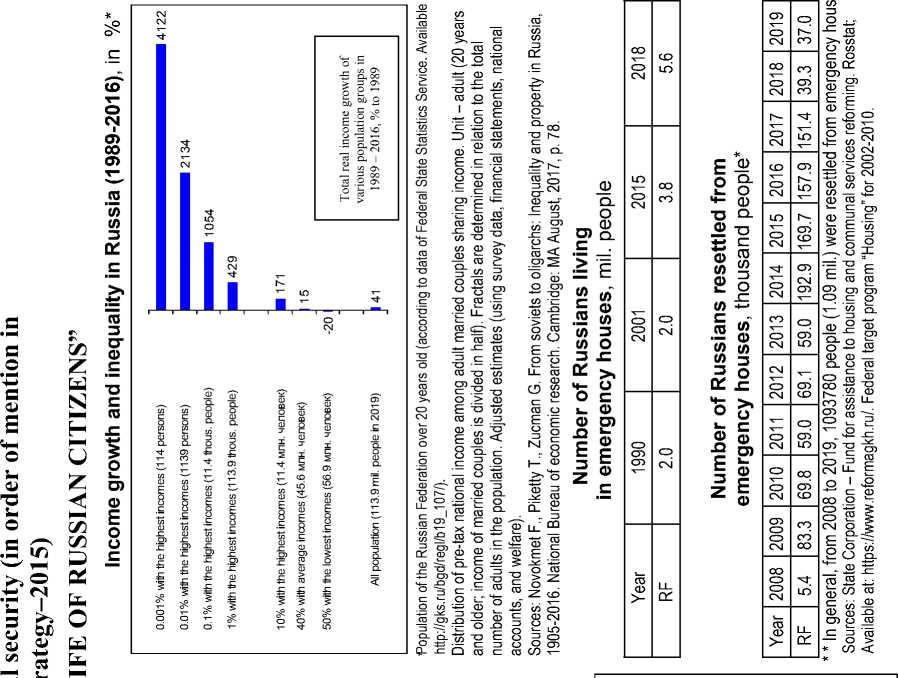
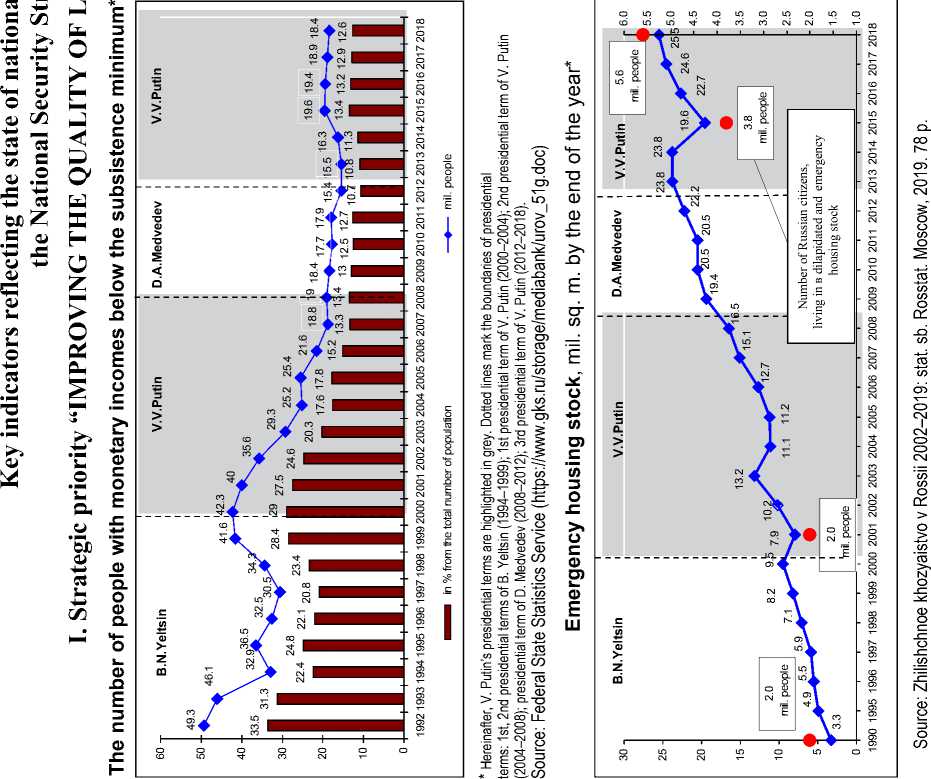
Continuation of Insert 3
|
CO см |
Ю CM |
Ю |
о |
|
Ю ^ я s |
о |
О |
см |
|
я CM |
CM |
co |
|
|
Ю о я CM |
CD |
Ю |
|
|
я s |
co co |
о |
co LT> + |
|
CD S CD CD |
CD cd CD |
co |
CM |
|
s S CD C^ |
О |
о |
co |
|
О 1— |
.<5 S |
СП E О |
О "T^ s_ 8 g .£ Ё S '8 |
CD
О
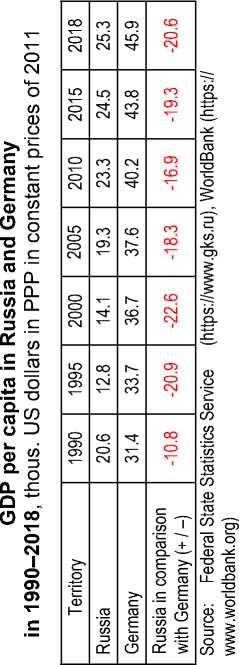
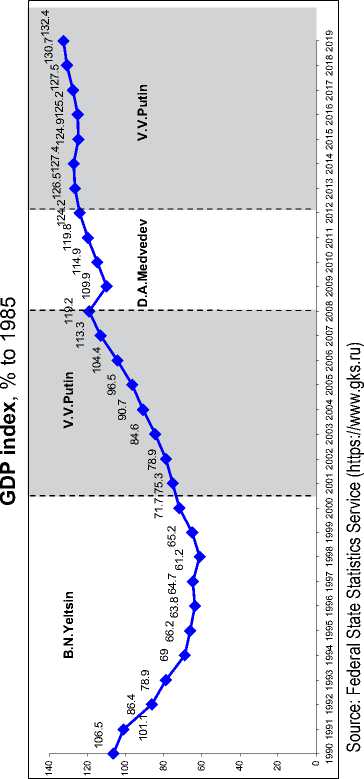
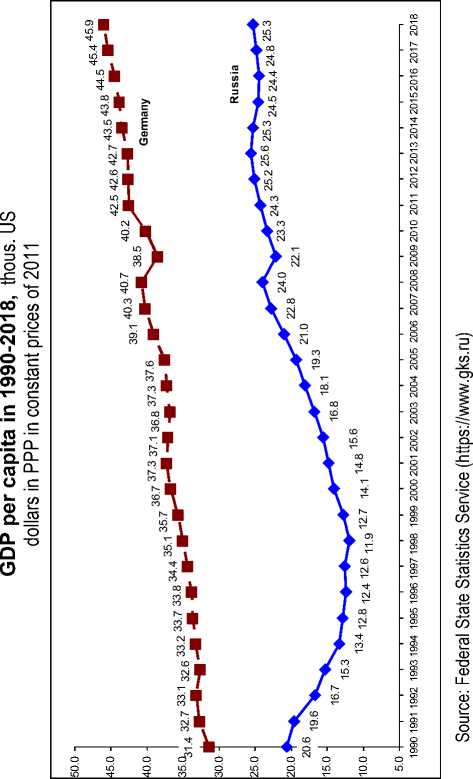
Continuation of Insert 3

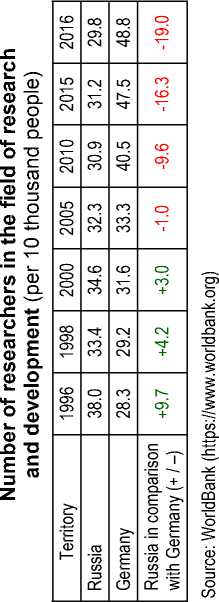
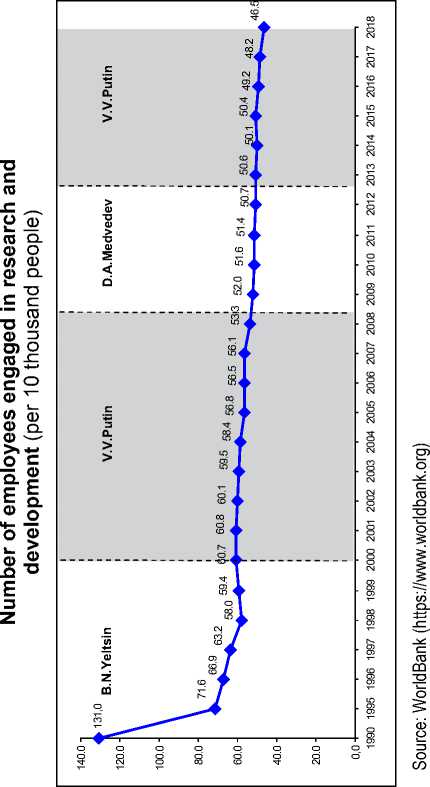
End of Insert 3
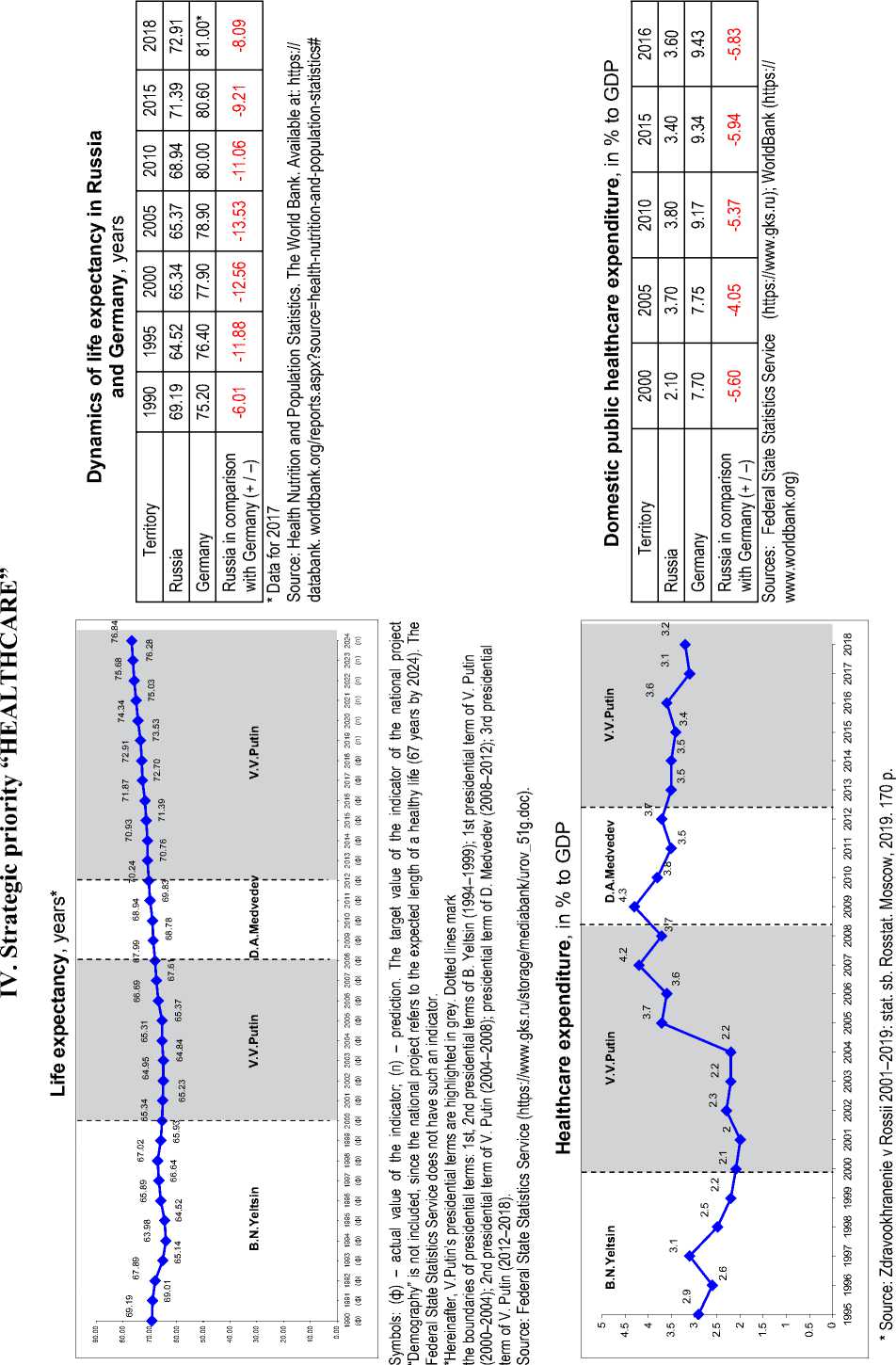
The aforementioned course of events, the priorities, which V. Putin set for himself in various historical periods, and the problems, the country has faced throughout this path, cannot be reviewed separately from the key aspects of national security. Therefore, various indicators that show its priorities (“improving of life quality of Russian citizens”, “economic growth”, “science, technology, and education”, “healthcare” 34 ) clearly indicate the “recovery” growth in the first half of the 2000s, and the slowdown of the development rates after the global financial crisis, and the absence of any signs of a breakthrough at a time when the President made it clear that history no longer leaves Russia no time for buildup ( Insert 3 35 ).
The data, presented in insert 3 , which cover the period from the beginning of the 1990s, clearly show the critical state of the country, when it was “embraced” by V. Putin. Despite all the difficulties that Putin had to face during his presidential terms, he managed not only
…The discussed project of the Constitution with all amendments cuts off liberals-marketeers from power in the long-run.
The ruling elite was completely satisfied with the current liberal-oriented Constitution, it interpreted the laws as it wanted. Changes were needed when the end of Putin’s fourth term loomed on the horizon. The elite, apparently, wanted to get a mandate to change the Constitution in a way that would allow a new configuration of state institutions to maintain the current system of distribution of power, or simply legislate the influence of Vladimir Putin after leaving the post of the President. However, in fact, it received a request for a new Constitution of a paternalistic, Soviet style… 36
to preserve Russia, but also to make it one of the centers of a multipolar world that can no longer be ignored. Only the periods, when the President, for reasons beyond his control, had to focus on foreign policy, and the implementation of domestic development goals was carried out by the government of D. Medvedev, were the periods of economic stagnation and slowed development rates that pushed Russia back, making it difficult to achieve the Great strategic goal set by the President in 1999. 36
In the Address–2020, the President initiated the most ambitious amendments to the Constitution in the entire period of its existence. Some of them were aimed at the nationalization of elites (prohibition for representatives of highest governing bodies to have non-Russian citizenship, the priority of the Constitution over the norms of international law), which, according to many experts, “offended quite a large number of quite influential persons. From Medvedev to very, very status-oriented liberals” 37 , effectively canceling all the forecasts and plans of the “collective West” for a successful transit in 2024.
“In our country, the foreign policy has been determining the domestic policy for all 29 years. Russia unconditionally recognized the priority of international law over national law and carefully adjusted the second one to the first one, trying to be an obedient adept of Western democracy. However, very soon, it became obvious that the most “inviolable” international law is easily violated in relation to Russia. There are sanctions regimes, which are not defined by any international laws, attempts of our political isolation, and military operations without regarding the UN. Now, this Putin’s historical statement sets priorities in reverse order. Boldly, and, most importantly, correctly, but a little bit late. About fifteen years! But, as they say, better late than never”38.
Another part of constitutional changes was aimed at improving the effectiveness of the political system by giving greater weight to the State Duma, the State Council, and the Constitutional Court in making managerial decisions (and, in particular, in appointing members of the Cabinet of Ministers), as well as by including the municipal level in the overall structure of state administration. According to the President: “... according to our Constitution, municipalities are not directly connected with the state, and there should be a unified system of public power, so that the upper floors of this power have responsibility for what is happening at the bottom, and those, who work in municipalities, would be connected in a certain way with the country and its interests ” 39 .
Finally, the third part of the amendments was aimed directly at society – the fixation of the regular indexation of pensions and the norm that the minimal salary cannot be lower than the subsistence minimum in the Constitution. Of course, we can say that this norm is already enshrined in the Labor Code of the RF, and, in the Constitution, we should write not about the subsistence minimum, but about the living standards... however, at the current historical stage, this amendment should not be regarded as exhaustive; its meaning is to provide constitutional guarantees of a stable level and quality of life for all major segments of the population.40
Thus, the President not only reformed the entire political system of the country, creating several “centers of gravity” and giving a significant role in public administration to society; not only he took a number of measures aimed at the nationalization of the elites, qualitatively limiting the authorities of the “collective West” and associated internal elites in the management of the country, but also appointed a new, significantly different in its spirit, Government, which was summoned to do what the previous Cabinet of Ministers failed to do.
The scale of constitutional changes, introduced by always cautious and careful Vladimir Putin (let us recall his assessment of Lenin’s mistakes) suggests that, in the Address, we heard not only about a transit model, but about the task of the systemic reconstruction of Russia. This is not a sudden or situational decision in response to unrestrained part of the elites, who considered the President a “lame duck”, or a drop of authorities’ ratings. It seems that the reforms are well thought, and they fit into the historical rhythm of the country’s development , adopted by Putin. It is also a respond to the crisis of the management model, which emerged at the end of the 2010s 40 .
We can probably agree with the experts, who say that the President was somewhat late with his decisions, and these changes should have been made a year, or two, ago. However, the most important thing is that he did it. A delay only complicates the tasks, which the new Government, the President, and the entire system of public administration face, but it does not make their implementation impossible.
Obviously, the President considered this fact, because the proposed candidate for the position of Prime Minister and practically a new structure of the Government (which added 16 new faces and completely changed social block) largely represent a new Russian political wave – technocratic government representatives, and, according to experts, “countries resort to the technocratic method of forming management in the times of crisis” 41 , when it is necessary to “show results” quickly and efficiently.
The composition of the new government, formed for Mikhail Mishustin, causes moderate optimism. First, because of its lack of outspoken liberals, who are repulsive to everyone without exception. Despite the moderate, not striking liberal Anton Siluanov, who retained the post of Finance Minister, but deprived of the vicepremiership... “The most important link of the new government will be the tandem of Mishustin and Belousov. This is an interesting commissure of a very strong administrator and an ideologist of transformations, currently being carried out in the economy. The question is whether these two very different specialists and persons will be able to work together” 42 .
Some experts, while expressing doubts about the prospects of the new Government, say that many new members of the Cabinet of Ministers do not have the experience of state governance. They have certainly proven themselves in managing regions, individual services, departments... but now they will have to solve completely different issues and deal with completely different resources. Therefore, “the Government will really be technocratic, but in a narrow bureaucratic sense, in the logic of “small affairs” ... this is the limit of tasks – these appointments do not imply any structural reforms” 44 . 45
The new Cabinet of Ministers will continue the socio-economic policy of the government of Dmitry Medvedev. As the head of the Bank of Russia, madam Nabiullina is a guarantee of this. The responsibility is also on Finance Minister Anton Siluanov and Deputy Prime Minister Tatyana Golikova, who will continue the work in the government 45 .
However, it is important to state something else: the majority of experts agree that “the Russian government has never been so nonpolitical as it is today” 46 and that “the new
Cabinet of Ministers is purely technocratic” 47 . This fact indicates the President’s determination to finally move the implementation of his promises and give a new pulse to the domestic development of the country. 4849
The situation that causes the forced nature of cardinal decisions, announced by the President in the Address–2020, is also largely related to the state of society. Over the last 25 years, Russian society has never been so “charged” (and constructively “charged”) with radical changes in the system of state management, which also determines the solution of socio-economic issues. “After going through the crucible of the wild capitalism of the 1990s, which burned the illusion of holiness of entirely market relations, after getting the experience of state capitalism of the 2000s, the public mind has acquired a clear perception of reality and the ability to adequately assess propositions of different political forces on the further development of the country” 48 .
We can confidently state that the vast majority of our people remained committed to the main value of the previous socialist period of development – the idea of social justice , understanding it as equal ownership of public wealth and equal access to the goods produced, regardless of the social status of a citizen and his material well-being. At the same time, it is equally certain that these people, not willing to give up their newfound personal freedom, suffered a certain balance between personal and public. The President also legislates visibly designated constants of people’s soul 49 .
It is not a coincidence that, in his Address, the President referred to this topic twice, starting his speech with the phrase that “our society is clearly calling for change. People want development, and they strive to move forward in their careers and knowledge, in achieving prosperity, and they are ready to assume responsibility for specific work. Quite often, they have better knowledge of what, how and when should be changed where they live and work, that is, in cities, districts, villages and all across the nation” and, at the end, summing up that “Russian society becomes more mature, responsible, and demanding”.
In other words, by introducing the amendments to the Constitution, the President reacted to deep domestic processes and expectations of people, which have been intensively developing in our society over the past five years, at the highest level of governance.
According to the results of a poll, conducted by VCIOM on January 24, 2020, Russians optimistically reacted to the new page of history started by the President on January 15: 79% of people considered the changes to the Constitution, proposed by V. Putin, important. 60–90% of people supported proposed changes 50 .
P. Krasheninnikov (co-chairman of the working group on preparing proposals for amendments to the Constitution of the Russian Federation. The composition of this group, in his words, “perfectly represents the structure of Russian society”) noted that “the President’s proposals, aimed at strengthening the country’s sovereignty and fixing the social orientation of the state, are most supported” 51 .
Thus, the decisions, made by the President at the beginning of 2020, are not exactly the results of his dissatisfaction with the progress of national projects, but a manifestation of his political will – a will of a person who has taken personal responsibility for Russia’s national security, and a will of a person who systematically achieves his goal of building the new, “post-Soviet” statehood, the understanding of which he publicly outlined 20 years ago. 52
Putin’s Address provokes optimism. Not a superficial, mood-based, easily exhaled optimism, but a growing confidence that we are inside some important process of formation. This “inside” feeling is still difficult to get used to. It is still easierfor us to complain about the lack of ideology of our existence. However, an honest observer should admit that Putin, declaring a facade of non-ideologism, works hard in the field of deep ideology for deep people. He methodically, very carefully, seeks new approaches to Russian ideology. And there is a growing confidence that he will not leave behind a country without ideology 52 .
It is difficult to disagree with the opinion of experts that “the changes, proposed by the President in the Address, only narrowly concern current political figures. They not only lay down the format of the presidential transfer-2024 and the roles of participants in the transit race, but also set the framework for the political and managerial system for many years to come. Vladimir Putin wants to go down in history as the architect of the new Russia”53 ...And not only as the architect, who designs and controls the process of building of the new Russian state, but also as a builder, who took an active part in this process. On this path, the President faces many external and internal barriers, but, looking back at 20 years of his presidency, it should be noted that there is a progress, and the general nature of this progress allows stating that V. Putin fulfills his historical mission with a firm hand.
* * *
In conclusion, we would like to quote one of Vladimir Putin’s speeches to the political public in February of 2012.
Shortly before the presidential elections on March 4, Vladimir Putin (while serving as the Prime Minister) decided to meet political scientists to discuss the course of the election campaign, current political processes, and his article “Democracy and the Quality of Government” 54 , in which the future President discussed the threats and prospects for the development of democracy in Russia and in the world, the problems of local self-government, the judicial system, etc.
The event was held in Moscow, in Novo-Ogaryovo. For four hours, a number of renowned experts55 discussed such hot topics as opposition protests, the return of direct gubernatorial elections, the presidential race, etc. However, despite a significant number of specific issues and problems that were discussed, the key point was that, at this meeting, Vladimir Putin fully revealed his inner scale as a statesman and historical figure who takes responsibility for the fate of Russia. In his responses, he described in details the strategy and goal that he set for himself in 1999, which he has been gradually moving toward over the years, and which he plans to further implement during his third presidential term:
“During my first and second Presidential terms, I have always thought about how we can make Russia’s fate independent of one, two, or three people, so that we can create a system, where we can clearly and surely guarantee our sovereignty, and, at the same time, a system, which would respond to all demands of the time, be alive, and develop. It has always been the most important task, but you were right when you mentioned the conditions, under which I had to start working. At the first stage, it was necessary to simply save the country, which was clearly falling apart, and it was necessary to restore the economy and social sphere in an elementary way. I should not, probably, mention now that not only pensioners had not received their pensions for months, the economy had not paid, and the army had not paid for months. It was the state of the social sphere! We had to stay alive at that time. We had to do the most basic things.
Now (and I mentioned this in an article, by the way), I believe that we are just finishing the stage of this post-Soviet period – the first stage of the post-Soviet period, and we can really start moving forward now. We have not had a basis until now. I often hear discussions of my articles (I am, by the way, very happy that it is discussed by those who support what is written, and those who criticize), I often hear the same argument from critics: why did not you do it before? It was either impossible to do this before, because there were no resources, no conditions, or these problems were not priorities. They were not as important as the problems we had to pay attention to first, because life constantly moves forward, the situation always changes.
However, I want to say something in this regard: we have been quite efficient so far, and it gives me the right to say that we will continue to act with the same efficiency. Therefore, the most important task here is (by the way, I also wrote it in my article) to logically conclude this main task: to create such a state body (I will repeat this not literally, but close to the text), such an economic system, such a social system that everything mentioned would be an alive, powerful, healthy organism that guarantees our sovereignty. At the same time, it should be alive, responsive to challenges of its time, changing, and, on this basis, it should guarantee long-term living standard of Russian citizens. It is, in fact, the most important task” 56 .
Список литературы Another step toward V. Putin's "long state"
- Presidential Address to the Federal Assembly, Jan. 15, 2020. The Russian President's official website. Available at: http://www.kremlin.ru/events/president/news/62582 (In Russian).
- Putin V.V. Russia at the Turn of the Millennium. Rossiyskaya Gazeta, Dec. 30, 1999. (In Russian).
- On the Strategy of National Security of the Russian Federation, the decree of the President of the Russian Federation no. 683, dated Dec. 31, 2015. Rossiyskaya Gazeta. Available at: http://www.rg.ru/2015/12/31/nac-bezopasnost-site-dok.html (In Russian).
- Presidential Address to the Federal Assembly of the RF, dated March 1, 2018. The Russian President's official website. Available at: http://www.kremlin.ru/events/president/news/56957 (In Russian).
- Evstaf'ev D. National modernization from above. Zhurnal "Ekspert", Jan. 27, 2020. Available at: https://expert.ru/expert/2020/05/narodnaya-modernizatsiya-sverhu/ (In Russian).
- Skorobogatyi P., Obukhova E. Constitutional state turn. Zhurnal "Expert", Jan. 20, 2020. Available at: https://expert.ru/expert/2020/04/konstitutsionnyij-gospovorot/ (In Russian).
- Amendments to the Constitution: Meaning and Relation. VCIOM press-issue, no. 4160, Feb. 3, 2020,. Available at: https://wciom.ru/index.php?id=236&uid=10146 (In Russian).

